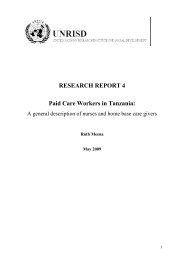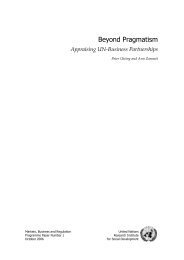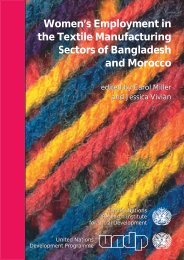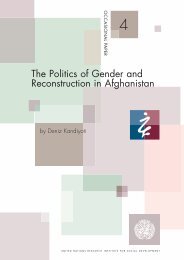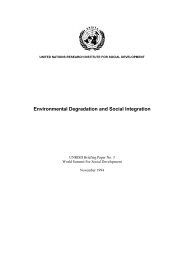communicating in the information society - United Nations Research ...
communicating in the information society - United Nations Research ...
communicating in the information society - United Nations Research ...
You also want an ePaper? Increase the reach of your titles
YUMPU automatically turns print PDFs into web optimized ePapers that Google loves.
What About Gender Issues <strong>in</strong> <strong>the</strong> Information Society?<br />
cation were weaken<strong>in</strong>g all <strong>in</strong>itiatives. The need to l<strong>in</strong>k women’s<br />
organizations nationwide became a priority, and she decided to launch<br />
<strong>the</strong> creation of an electronic communication network. With a m<strong>in</strong>imal<br />
<strong>in</strong>frastructure and some previous tra<strong>in</strong><strong>in</strong>g on <strong>the</strong> use of electronic mail, a<br />
group of women started Modemmujer, an <strong>in</strong>formation and communication<br />
network that aimed to streng<strong>the</strong>n women’s participation <strong>in</strong> this<br />
process. Dur<strong>in</strong>g <strong>the</strong> first years of work, <strong>in</strong> comb<strong>in</strong>ation with wellestablished<br />
technologies (radio, fax, pr<strong>in</strong>t media) and repackag<strong>in</strong>g<br />
<strong>in</strong>formation available onl<strong>in</strong>e, Modemmujer was able to bridge <strong>the</strong><br />
distance between women’s organizations and decision-mak<strong>in</strong>g processes<br />
(Sabanes Plou 2000).<br />
The need to streng<strong>the</strong>n <strong>the</strong>ir political participation encouraged<br />
Indonesian women’s activity <strong>in</strong> <strong>the</strong> field of ICTs. In 1998, when women’s<br />
organizations that had been demand<strong>in</strong>g <strong>the</strong> end of <strong>the</strong> Suharto regime<br />
came toge<strong>the</strong>r to work for democracy <strong>in</strong> <strong>the</strong>ir country, <strong>the</strong>y saw that <strong>in</strong><br />
order to <strong>in</strong>fluence <strong>the</strong> new political process and have a voice <strong>in</strong> decisions<br />
on <strong>the</strong> country’s future, <strong>the</strong>y had to build <strong>the</strong>ir own communication<br />
strategy. They wanted to share <strong>the</strong>ir ideas and proposals with as many<br />
o<strong>the</strong>r women activists as possible. With women’s organizations spread<br />
across <strong>the</strong> many islands of <strong>the</strong> extensive archipelago, it was crucial to<br />
identify a means of distribut<strong>in</strong>g and exchang<strong>in</strong>g <strong>in</strong>formation speedily at<br />
<strong>the</strong> lowest cost. A Web-based free mail<strong>in</strong>g list service became a feasible<br />
option. The Rumpun email Perempuan (Women’s Mail<strong>in</strong>g List) was<br />
launched <strong>in</strong> July 1998 with a handful of subscribers, which had<br />
multiplied by 10 <strong>in</strong> two years. The mail<strong>in</strong>g list covered action alerts,<br />
announcements, news clips, statements, press releases and discussion<br />
topics strictly on women’s issues and activism. By putt<strong>in</strong>g <strong>in</strong>to practice<br />
<strong>the</strong>ir right to communicate, Indonesian women were able to build<br />
toge<strong>the</strong>r strong positions on issues of national <strong>in</strong>terest (Buntarian 2000).<br />
How can women better <strong>the</strong> development of <strong>the</strong>ir communities or<br />
play an <strong>in</strong>formed role <strong>in</strong> public life, without access to pluralistic<br />
<strong>in</strong>formation, <strong>the</strong> means of public expression and shar<strong>in</strong>g knowledge?<br />
How can women work toward a new geopolitical order governed by norms<br />
of peace and mutual respect without channels of communication for<br />
dialogue and exchange of <strong>in</strong>formation? When ICT policy is l<strong>in</strong>ked to<br />
women’s human rights issues, as stated <strong>in</strong> <strong>the</strong> Beij<strong>in</strong>g Platform for<br />
Action, it can be seen that ICTs offer a potential for <strong>the</strong> defence and<br />
advancement of <strong>the</strong>se rights. Women worldwide are us<strong>in</strong>g ICTs to<br />
monitor <strong>the</strong> promotion and protection of <strong>the</strong>ir human rights, us<strong>in</strong>g <strong>the</strong><br />
Internet to denounce violations, send alerts and campaign for <strong>the</strong>ir<br />
rights. They are also us<strong>in</strong>g ICTs to facilitate communication among<br />
organizations, thus empower<strong>in</strong>g <strong>the</strong> networks that work to ensure that<br />
women have equal rights. Ga<strong>in</strong><strong>in</strong>g access to legal <strong>in</strong>formation (law and<br />
o<strong>the</strong>r legal <strong>in</strong>struments, new legislation and legal recourse, and<br />
15




